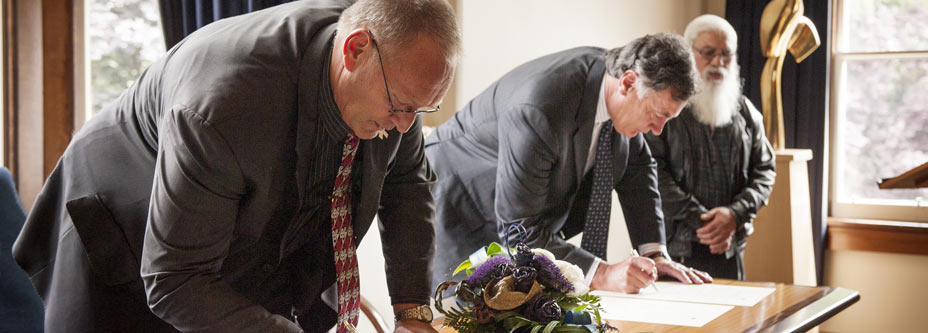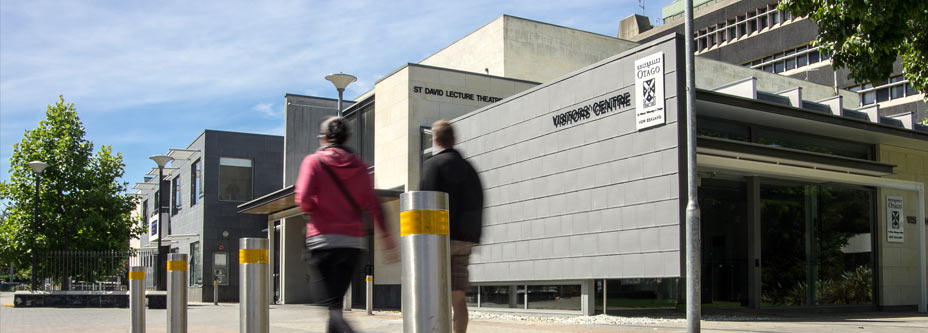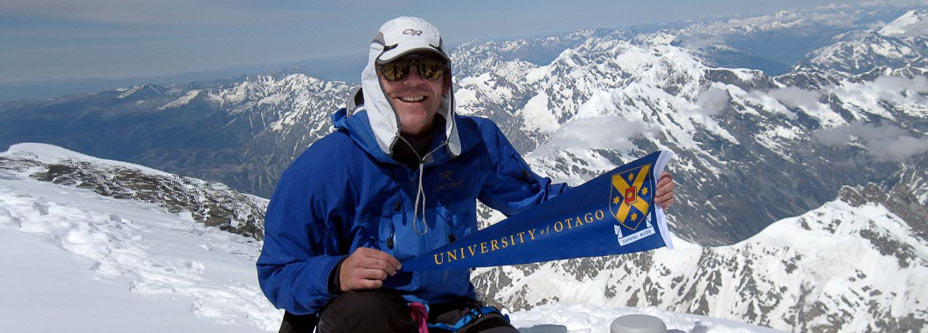
UniNews
MOU re-signed
The University and Ngāi Tahu have re-signed their Memorandum of Understanding (MOU), which was first agreed to in 2001.
The re-signing was an occasion to demonstrate how far Otago has come over the past decade to embed Ngāi Tahu goals and aspirations into its research and teaching activities, giving rise to higher numbers of Māori graduates than ever before.
Kaiwhakahaere of Te Rūnanga o Ngāi Tahu Sir Mark Solomon and University Chancellor John Ward re-signed the MOU after a special blessing and ceremony. The event was attended by representatives from three Ngāi Tahu rūnanga.
Speaking at the ceremony, Vice-Chancellor Professor Harlene Hayne emphasised that the MOU had to remain a “living and breathing” document, noting that the University had embedded Māori culture into its work, with some 678 research programmes involving Māori underway at the current time and a strong commitment to pastoral support of Māori studying at the University.
University Office of Māori Development Director Tuari Potiki (Ngāi Tahu) said it was clear that “an amazing success story is quietly happening” at Otago, and he hoped to have continued discussion over plans to further deepen the relationship between Ngāi Tahu and the University at meetings with rūnanga in the near future.
Banner caption: Kaiwhakahaere of Te Rūnanga o Ngāi Tahu Sir Mark Solomon and University of Otago Chancellor John Ward re-sign the Memorandum of Understanding between Ngāi Tahu and the University. Photo: Sharron Bennett.
Visitors' Centre opens

The University has opened a Visitors' Centre to provide an easily accessible “front door” to the Dunedin campus from Cumberland Street. The centre is located on the north-western side of the St David Lecture Theatre complex and features displays, merchandise, interactive screens and general information for visitors. Photo: Melanie Middlemiss.
Otago gains Fairtrade status
Otago has been granted Fairtrade accreditation, becoming the first New Zealand university to enjoy this distinction. The University joins more than 100 other universities around the world that have become Fairtrade institutions.
Announcing Otago's new status, Vice-Chancellor Professor Harlene Hayne congratulated staff and students on the accreditation.
“The Fairtrade ethos fits well with our strategic plan and there is no doubt that Fairtrade is a positive and growing movement. It is proof that we act in an ethically, socially and environmentally responsible manner.”
New teaching master's
Otago is at the forefront of a new initiative that allows high-performing graduates to become primary or secondary teachers and gain a master's degree within a year.
The new Master of Teaching and Learning (MTchgLn) is a first for New Zealand. The Universities of Waikato and Otago collaboratively designed the programme, which draws on the research strengths and staff expertise of both institutions.
Each institution will award its own master's degree. The MTchgLn has a major school-based component that focuses on raising the achievement of learners.
Performing arts degree
The University has launched a Bachelor of Performing Arts (BPA) degree for students whose career aspirations involve music, theatre and dance.
The three-year degree is available for the first time at Otago from this year. A collaboration between the Theatre, Music and Dance programmes at Otago, it is designed to give students the opportunity to study and train in the different performing arts as part of the same qualification.
Top of New Zealand

The University of Otago flag, held by Dr Nicolas Cullen (Department of Geography), flies near the top of New Zealand's tallest peak Aoraki/Mount Cook. However, the expedition by Otago researchers last November has shown that Aoraki is not as high as previously thought. The project (led by Surveying's Dr Pascal Sirguey) has shown that the mountain is only 3,724 metres at its highest point, 30 metres less than previously thought. Photo: Geoff Wayatt.
Marsden Fund success
Otago researchers were awarded $13 million in the Marsden Fund's latest annual round to carry out world-class research in their respective disciplines.
A total of 22 research projects at Otago received $13 million (excl. GST) in the funding round, which is announced each year for research in science, technology, social sciences and humanities.
Deputy Vice-Chancellor (Research and Enterprise) Professor Richard Blaikie warmly congratulated the successful researchers and their projects.
“They are outstanding in their fields, continuing the proud tradition at Otago for excellence in research that contributes to both national and world knowledge across a wide spectrum of disciplines. They have done extremely well to successfully attract the funding in a round that is so highly competitive.”
Obituary
Donna-Rose McKay
Head of the University's Disability Information & Support Service

Donna-Rose McKay and members of the Disability Information & Support team.
The University is mourning the loss of a highly respected staff member who was a national trailblazer in the area of disability issues and support. Donna-Rose McKay died in December after a short illness. Donna-Rose began her work at the University in 1992, when she was appointed to a newly-created part-time position of disabilities co-ordinator, a first for any New Zealand university.
In a eulogy, University Director of Student Services Mr David Richardson described Donna-Rose as a “determined and fearless woman [who] took on anybody or any institution that had, or created, barriers for students with a disability” and noted that she was the founder and driving force behind the establishment of ACHIEVE, the national post-secondary education disability network.
Vice-Chancellor Professor Harlene Hayne paid tribute to Donna-Rose as being a fierce advocate for the students in her care and living her life committed to the notion that every student had the right to study at Otago.
“She reminded the rest of us each and every day that it was our collective responsibility to make sure that happened. I know that Donna-Rose changed the lives of many – her personal strength empowered a whole generation of students.”
Appointments
Professor Alison Heather to the Chair in Physiology. Dr Heather comes to Otago from the University of Technology, Sydney. Her research areas include anti-doping in sports and investigating how inflammatory processes contribute to the development of atherosclerosis.
Professor Michael LeBuffe to the Baier Chair in Early Modern Philosophy. Dr LeBuffe focuses primarily on the moral theories of Hobbes and Spinoza. He joins Otago from the University of Texas A&M Department of Philosophy, where he was Director of Undergraduate Studies.
Awards/ Achievements
Six Otago academics were among the 13 leading New Zealand researchers and scholars in basic and applied science and the humanities recently elected as Fellows of the Royal Society of New Zealand. Professor Antony Braithwaite (Pathology, Dunedin) Professor Gregory Cook (Microbiology and Immunology), Professor Jörg Frauendiener (Mathematics and Statistics), Professor Philippa Howden-Chapman (Public Health, Wellington), Professor Lisa Matisoo-Smith (Anatomy), Professor Richard Walter (Anthropology and Archaeology).
Professor Gerald Tannock (Microbiology and Immunology) was awarded a James Cook Research Fellowship to support his innovative studies into bacterial communities in the gut and their role in health and disease.
Professor Michael Baker (Public Health, Wellington) has been awarded Health Research Council's Liley Medal, which is presented annually to recognise an individual whose recent research has produced a significant breakthrough within the health and medical fields. Professor Baker was honoured for a 2012 study showing a dramatic rise in the incidence of serious infectious diseases and rising inequalities across populations in New Zealand.
Professor Richard Blaikie (Physics and Deputy Vice-Chancellor (Research and Enterprise)) was presented with the 2013 Hector Medal for the advancement of physical sciences in recognition of his fundamental and wide-ranging contributions to the field of nano-optics. His achievements include providing a world-first experimental demonstration of a controversial superlens system using sub-wavelength techniques.
Professor Jim McQuillan (Chemistry) received the Royal Society of New Zealand's T.K. Sidey Medal, which recognises outstanding scientific research in the field of electromagnetic radiation. Professor McQuillan co-created the surface-enhanced Raman scattering (SERS) analytical technique and has developed infrared spectroscopy to examine wet metal oxide nanoparticles.
Professor Brett Delahunt (Pathology, Wellington) has received the rarely awarded International Academy of Pathology Distinguished Pathologist Medal. He was also awarded the Grawitz Medal in recognition of his distinguished contributions to the advancement of urological pathology internationally, and his key role in enabling formulation of new guidelines for the classification and reporting of prostate and renal cancer.
Three Department of Chemistry staff were recently awarded national prizes by the New Zealand Institute of Chemistry. Its Easterfield Medal went to Dr James Crowley, the Maurice Wilkins Centre Prize for Chemical Science to Emeritus Professor Rob Smith, and the Shimadzu Prize for Applied and Industrial Chemistry to Associate Professor Nigel Perry.
Japanese programme teaching fellow Haruko Stuart took top honours in the Otago University Students' Association 2013 teaching awards. She was one of 10 finalists selected from more than 300 student-nominated teachers across the University. The awards also featured an Inclusiveness in Teaching award section, which this year had three recipients: Associate Professor Leigh Hale (Physiotherapy), Dr Gill Rutherford (Education) and Tony Zaharic (Biochemistry).
Dr Suetonia Palmer (Medicine, Christchurch) and Dr Angela Wanhalla (History and Art History) gained Rutherford Discovery Fellowships to help them develop their research careers in New Zealand. The fellowships are valued at $800,000 over five years.
Otago BSc (Hons) Physics graduate Edward Linscott has been awarded a Cambridge-Rutherford Memorial Scholarship to the University of Cambridge to undertake doctoral study into the often bizarre behaviour of condensed matter systems.
Associate Professor Takashi Shogimen (History and Art History) won Japan's 2013 Suntory Prize for Social Sciences and Humanities (History and Civilisation Section), for his book in Japanese, Yoroppa Seiji Shiso Tanjo (The Birth of European Political Thought).
Ms Ceri Warnock (Law) received New Zealand's premier legal research award, the 2013 New Zealand Law Foundation International Research Fellowship. The fellowship is awarded annually to enable an individual of outstanding ability to undertake legal research that will make a significant contribution to New Zealand.
Otago Geography master's graduate David Gawith has gained a Woolf Fisher Scholarship for University of Cambridge doctoral study into the impact that climate change-induced changes in water availability will have on livelihoods.
Ben Abraham, a recent BA (Hons) Politics graduate, was awarded a Rhodes Scholarship for postgraduate studies at Oxford University, where he intends to pursue development studies.
Honorary Doctorate
In December, the University conferred the honorary degree of Doctor of Science on Professor Sir Peter Gluckman, one of its most distinguished medical graduates. Sir Peter is world-leading medical researcher focusing on human growth and development and was appointed as the first Prime Minister's Chief Science Advisor in 2009.
Professorial promotions
The following leading Otago academics have been promoted to full professorships, effective 1 February: Blair Blakie (Physics), Stephen Cranefield (Information Science), David Gerrard (Dunedin School of Medicine), Mark Hampton (Pathology, Christchurch), Tony Harland (Higher Education Development Centre), John Knight (Marketing), Craig Rodger (Physics), Philip Seddon (Zoology), Richard Troughton (Medicine, Christchurch), Michael Williams (Dunedin School of Medicine), Steve Wing (Marine Science), Michael Winikoff (Information Science).
New Year Honours
Otago alumni and staff to receive New Year Honours include:
Companion of the New Zealand Order of Merit (CNZM): Mr Peter Townsend, for services to business and the community.
Officer of the New Zealand Order of Merit (ONZM): Mrs Jane Annear, for services to local government; Mrs Elizabeth Chesterman, for services to the Cancer Society of New Zealand; Dr Stephen Goldson, for services to science; Dr Tearikivao Maoate, for services to Pacific health; Professor Stephen Munn, for services to health.
Member of the New Zealand Order of Merit (MNZM): Mr Barry Clarke, for services to the community; Dr Gary Evans, for services to science; Mr Alexander Familton, for services to local body government; Ms Patricia Hubbard, for services to early childhood education; Dr Allan Panting, for services to orthopaedics.
Companion of the Queen's Service Order (QSO): Mr John Pike, for services to the law.
Queen's Service Medal (QSM): Dr Logan McLennan, for services to health and education; Mrs Janice Taouma, for services to early childhood education.
Professor Glenn Summerhayes (Anthropology and Archaeology) was made an Officer of the Order of Logohu (OL) by the Government of Papua New Guinea for service to the community through his significant contribution to the archaeology of Papua New Guinea.
